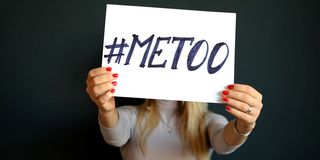When workplace becomes a den of sexual harassment

The moment I posted my feature story titled “the silent monster that is workplace sexual harassment” on social media, many women commented that they had been victims but had nowhere to report as their offender were the “men on top.” It meant they had to quit their jobs to save their dignity. “I worked for a serial sexual predator who was also emotional abuser. Once you refuse the advances, the work environment becomes so hostile. You try to persevere and stay because you need the sustenance, but eh, it affects your mental health and productivity. I just quit.” One lady commented.
It was #MeToo moment for women adding to a growing list of sexual harassment allegations at workplace.
Even men came to the post to comment that they know victims who were too afraid to come forward and get to the bottom of the issue. One colleague from Ghana sent me a direct message about sexual harassment after reading the story; this is just a tip of the iceberg of how this issue is still discussed in muted tones. Another one in Nairobi mentioned about micro-sexual aggressions at workplace, which usually pass as the norm. I remembered when a male colleague tried to hug me from the back when I was standing at a reception, it was such an awkward moment that caught me by surprise, luckily I stopped him right and told him that it was gross. Another time, I remember when a few members of women journalists met when I brought up this discussion of touching people without consent which goes on in many offices. They all told me that it is just “utani” or joke so I shouldn’t take it seriously. This got me thinking; isn’t it time we set a new normal by tactfully denouncing sexual harassment in a society which has decided to find ways to justify it as a norm and live with it? We should not allow serial harassers or sexual predators to burry their crimes and get away with it. Sexual Offences Special Provisions Act, 1998 that has been incorporated in the penal code and criminalises sexual harassment.
And if the recent survey by journalists across the country coordinated by the Tanzania Media Women’s Association (TAMWA) is anything to go by, sexual harassment is a ticking bomb. This calls for an honest conversation about this issue and coming up with proper mechanisms of addressing the same. Sexual harassment at work is no longer confined to unwelcome sexual behaviour, which could be expected to make a person feel offended but it can also be a behaviour that is not mutually agreed upon to make one be humiliated or intimidated at work, work-related events or where people are carrying out work-related functions or between people sharing the same workplace. It is so unfortunate that in some of the organisations where sexual harassment takes place, there are good policies but the patriarchal culture, which is so entrenched, makes this vice thrive. Many women who are victims are faced with options of speaking out and going home hungry after losing job in the process. This means sexual harassment is a tool wielded by those in power to assert their dominance. This is why; employers should come up with transparent recruitment, orientation and work process and a reporting mechanism, which also protects the victims while punishing the offenders. This would help in breaking the silence. Even the data is not easy to get going by the nature of the vice. As journalists, it is our duty to raise the red flag that sexual harassment is rife and should be stopped. For employers, it is time to involve all employees in the fight against sexual harassment by coming up with strong anti-harassment policy, promoting transparency in recruitment process, allowing confidential reporting, conducting a culture audit and quipping the workforce to support the victims. Only that way, we would turn tables and end sexual harassment at workplace.




